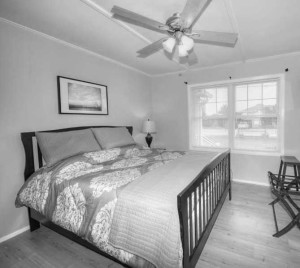 I’ve made one change in recent years that’s had a dramatic effect on my productivity, sleep, mood, focus, and concentration.
I’ve made one change in recent years that’s had a dramatic effect on my productivity, sleep, mood, focus, and concentration.
For at least one hour after waking up and at least one hour before turning off the lights and going to sleep I do not look at a screen of any sort. That includes everything: television, laptop, tablet, and phone.
There is numerous research showing that staring at a screen around bedtime impacts sleep since looking at a lighted device makes your body think it’s still light out. Plus electronics keep your brain busy and distracted at a time when it should be winding down. Remove all electronic devices from your bedroom and see how your sleep (and sex life) improves.
If you use a smartphone as an alarm clock, get a traditional alarm clock. Yes, this seems against the Live Lean philosophy. After all, a smartphone allows us to eliminate a number of gadgets. But having a smartphone in the bedroom makes it more tempting to use it. Plus, no matter how diligent you are about shutting off the device’s alerts and beeps, you’ll inevitably forget and be awoken by an unimportant midnight text by a night owl friend.
For most people, the challenge here is to eliminate television, social media, texts, and email from the evening. But the best way to get adequate sleep and better sleep while clearing time for more important stuff (like sex in the evening or working out in the morning) is to undergo this digital blackout.
If you’re lacking time for sleep, sex, exercise, or reading, you can reclaim it by ignoring screens for at least an hour before bed and an hour upon waking up.
Reading is the best way to wind down before turning off the lights. It’s not a good idea to read a thriller or mystery novel that will keep the mind racing and inspire you to stay up until the exciting conclusion. But set aside a few magazine articles or, better yet, some boring stuff you need to read for work that’s not pressing. It will help you sleep better and might even put you to sleep with the lights on.
If you think you’re too busy or popular to adopt this blackout, think again. A while back I was staying with a friend and his wife. This friend is the owner of several companies, with more than 3,000 employees. He is a speaker, consultant, and expert sought after by prominent athletes and business people. And yet whenever I stayed at his home, I never saw him look at his phone, tablet, or laptop in the evening. He didn’t even keep his phone nearby, even though he deals regularly with these prominent folks.
Early in the smartphone era, my friend saw me checking my email frequently well into the evening. “You know,” he said matter of factly. “All of that will be waiting for you in the morning.”
That’s so true. I figured if he could let the digital distraction go for an hour or two at night, then so could I.
The same is true with the morning. If you look at a screen, especially a phone, within an hour of waking up, you’re immediately distracted by the needs and wants of others. If you wake up early – and you will wake up early by eliminating screens at night and getting better sleep – you’ll have plenty of time to train, stretch, meditate, and fuel your body properly for the day. That first hour should be yours alone.
The only exception I make is for a quick glance at my phone for texts that might have come from my morning training partners or folks we carpool with who might have a change of plans. But that’s all. I don’t glance at other texts – there usually aren’t any – and I certainly don’t fall down the rabbit hole of social media, news, and email.
By implementing these one-hour digital blackouts as bookends to my day, I’ve carved out that time for myself and set the tone for both the day and the following day. I’m more focused, energized, productive, and calm, and the agenda I set is thus my own.
